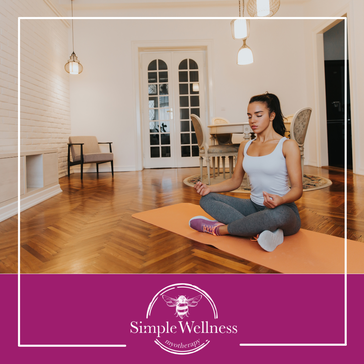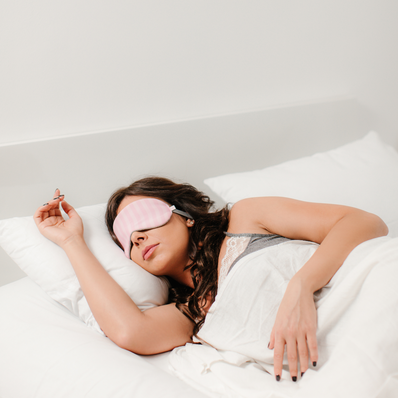|
By Jacqui Mulholland You might be wondering about the benefits of a regular meditation practice on your quality of sleep. What is happening in the brains of meditators and how can you utilise some simple techniques to improve your sleep? It has been shown in scientific research studies that meditation improves the production of melatonin naturally and very significantly. So what is melatonin?
It is a chemical hormone that is produced in the pineal gland that is designed to prepare the body for sleep. Levels usually tend to peak around bedtime, when the natural light dims with the setting of the sun and our biological system prepares for sleep. Melatonin is necessary to strengthen and support the body’s immune system, slow down the ageing process, and is also linked to the prevention of numerous diseases. Unfortunately our increasing dependence on technology and unnatural light source exposure on our many devices and screens have increased, as well as the social and cultural demands to work longer, harder and through the night have upset this delicate natural balance. Our bodies aren’t given adequate opportunity to disengage from the busyness and the overstimulation of your brain to allow your body to prepare for sleep. The light and our addiction to technology hijacks your awareness, bypassing your body’s natural signals that your brain is ready to sleep. There have been studies that have shown that regular meditation can help increase the production of melatonin in your brain, resulting in better sleep quality and even assist in the prevention of many diseases. This is just one of the very good reasons to start introducing a simple regular meditation practice to support the rebalancing of this natural process that is critical to our health and wellbeing. And the good news is, you don’t have to meditate for hours a day and you don’t even need to do it at the same time each day for it to improve your sleep. Even 15 - 20 minutes a day can help increase your melatonin production. The obvious time to try this, would be around bedtime when you could use this time to establish a new habit of disengaging from your devices and switch off the lights and devote some real time to this process of slowing down and encouraging the natural rhythms of your body to kick in. The meditation can be done lying down in bed, and you can get nice and warm and comfortable and allow your body to naturally settle into the space and begin to turn your attention inward, focusing on your senses and the flow of your breath. Focus on relaxing, releasing and sinking your body weight into the bed. This might ease you into a deep & restful sleep. Or you can do this as a practice just before bedtime in a safe cosy space to prepare for sleep. Even if an evening practice sounds like it wouldn’t suit, you could try another time of day, morning, afternoon, early evening, the effects are the same. You are still promoting the regulation of the production of melatonin and offering your body a nurturing space. Regular meditation supports a number of functions in the body and can improve overall health and wellbeing by prioritising your downtime. Helping you practice slowing down and taking time to tune in to your body so that you become more aware and responsive to your needs. Another important part of this process is it helps to reduce the amount of cortisol (stress hormone) active in your system as you initiate the relaxation response. Without this crucial step your body will have a very difficult time recovering from illness & injury including soft tissue and muscle repair. Meditation helps to regulate your internal environment by balancing hormones and allowing your immune system to function more effectively. Sleep is also crucial to this process. Another effective technique to further assist you with your sleep and ability to regulate and engage the relaxation response is massage. Massage has also been shown to improve sleep quality and the beauty of massage is you can combine it with a meditation practice while you are receiving your treatment. If you are having trouble sleeping and want to try a natural and proven technique that you can do yourself at home to support the recovery of your body, give yourself 10 - 15 mins a day of quiet downtime (no screens!). If you would like some assistance with establishing a meditation practice, I can help you out. I am a qualified meditation teacher with over 5 years experience and a meditation coach for the Australian Centre for Meditation & Mindfulness. Ask me about how to become familiar with the concepts of meditation and mindfulness so you can take some simple skills and techniques home and use them in your own time. I work one on one with individuals via zoom, in small groups online and in person to guide you through a full meditation practice, teach you simple techniques to get you started and offer you personalised support as you are establishing your own home practice. There can be several obstacles and challenges to starting a new meditation routine, which is why having the support of a coach or a meditation group is so important and will increase your chances of being able to sustain and support a simple meditation practice that suits your lifestyle. Want to learn more or find out about working directly with me? You can ask me at your next remedial massage appointment, or you can contact the clinic directly by email to [email protected] or calling our team on 03 8204 0970.  It has been widely accepted and researched that meditation and in particular, mindfulness meditation can have many benefits for stress management and improvements to concentration and focus. Many studies have explored the impacts of long term meditation on the brain. So we know that meditation can change the brain and improve cognitive function and emotional regularity. How about pain management? Can a meditation and mindfulness practice assist with chronic and acute pain conditions? How can you access these benefits through integrating a regular meditation practice into your wellness toolkit? What is Pain? Firstly, it’s important to note that pain has two main elements. Pain consists of a physical sensation, usually described as unpleasant or undesirable, and an emotional response. Whilst you are experiencing pain in your body, a message is sent through nerve fibres through your central nervous system to your brain to signal that there may be damage or threat of damage and this area is in need of protection immediately. There is the other function of the brain that has the power to enhance or reduce the intensity of this experience. Your emotional response. Your brain will attempt to interpret the sensation, often making a quick judgement to be able to respond in the best way to keep you safe from harm. This often happens with very little thought or awareness as your body has been doing this and responding in this way your whole life. It is automatic and unconscious, initiating your fight or flight response. This has kept you safe and works very well for those moments that threaten your safety. So pain has a very important purpose. Once the initial threat has been removed however, we may be left with the emotional response to the lingering effects of whatever damage was sustained from the event. Here is where meditation can become a very useful tool to restore calm to your nervous system by triggering the relaxation response. This is where you rest and digest, and where tissues and structures of your body can receive the natural healing intelligence of your body restoring its internal balance and optimal function. There are different types of pain. There is the obvious “loud” pain and there is the less obvious, dull aches and mild discomfort which can also trigger the emotional response. These more subtle signs and symptoms of pain can be an early warning sign of things being out of balance and not functioning effectively. Overtime, the emotional effects of low grade chronic pain can impact quality of life and ability to focus, movement and performance. So pain that doesn’t resolve itself within a few days should never be ignored. What Stress & Anxiety Does to Pain? Anxiety can cause you to become hyper alert to pain, catastrophize, overthink, over analyse, even causing a sense of panic, which can all exacerbate symptoms. Stress has been known to decrease your pain threshold by inhibiting the release of Serotonin. Serotonin is a chemical that is released to assist with pain relief. Chronic stress and anxiety takes a toll on your overall health. Mental, emotional, physical & spiritual health are all connected. You cannot impact one without affecting the whole. Therefore when you start to take care of your mental health your physical health will improve. Conversely, when you start taking care of your physical health, your mental health will be positively impacted. So when you adapt practices that are holistic in their approach, you will likely feel the benefits holistically. How Does Meditation Help? Combined with other medical and/or complementary therapies, meditation can offer your body the opportunity to settle into that relaxation response and allow your body to rest and heal physically. Restoring balance and internal harmony, boosting your immune function, and increasing production of Serotonin. Serotonin not only inhibits pain perception, it also acts as a mood stabiliser. So this acts to help regulate both your physical and your emotional pain responses. The impacts of relaxation and mindfulness can help you lessen the intensity of the experience of pain. There are several meditation and mindfulness techniques that can help this process. The way to begin is just by practising and trying out different guides, teachers, sounds, a local meditation group and/or meditation app to find a few techniques and styles of guidance that resonate with you. Everyone is different, and this is a very personal preference. If you try one style that you wasn’t for you, keep exploring! There is no right or wrong may to practise, so just do whatever works for you, and allow your practice to evolve and change overtime as you become more familiar with it. Stay tuned for your opportunity to join a guided meditation group at Simple Wellness Myotherapy! We will be offering an evening group once a week of consisting of a fully guided meditation for you to experience the benefits of practising in an intimate group setting. This will help get you started and you will be able to ask questions and receive support as you develop and deepen your practice. Want to book an appointment with Jacqui, our Remedial Massage Therapist and Meditation teacher? She's here during school hours on Mondays and Wednesdays, and afternoons on Thursdays. |
Meet Our Team
We have a team of great practitioners available 7 days a week at our Rowville clinic. Archives
July 2024
Categories
All
|
Got a question about Myotherapy?
Contact Mel by phone, email or Facebook
|
Simple Wellness Myotherapy & Remedial Massage Clinic
Shop 12B 150 Kelletts Rd Rowville VIC 3178 |
Phone us on
03 8204 0970 |


 RSS Feed
RSS Feed